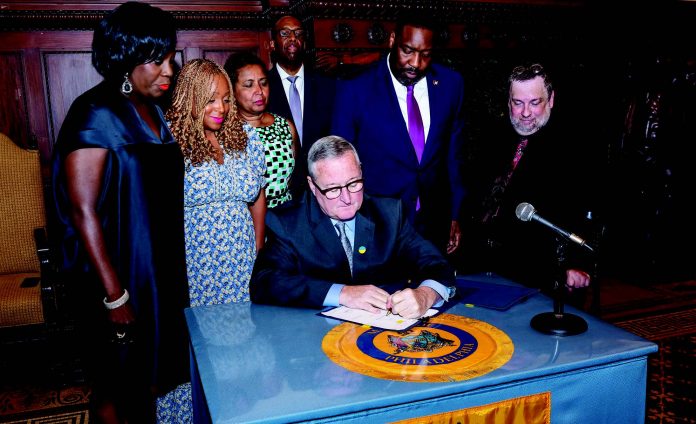PHILADELPHIA, July 27, 2022 — Mayor Jim Kenney signed into law bills that provide significant relief for homeowners affected by the recent tax assessments by expanding the City’s Senior Citizen Tax Freeze Program (Bill No. 220499) and Longtime Owner-Occupants Program (Bill No. 220497). These changes dramatically increase access and eligibility for thousands of Philadelphia’s vulnerable homeowners and increase the value of the benefit for many households.
Last month, Kenney also signed into law Bill No. 200012, which increased the City’s Homestead Exemption from $45,000 up to $80,000, effective for Tax Year 2023. This means $80,000 of a property’s assessed value will be exempt from property taxes. According to 2023 data from the Office of Property Assessment (OPA), $194,200 is the median value for Philadelphia owner-occupied homes. This change will be reflected in Real Estate Tax bills for 2023.
For a Philadelphia homeowner, the increase in the Homestead Exemption to $80,000 means most homeowners will have an annual savings of about $1,119 on next year’s property taxes, up from $629 this year. Once the City of Philadelphia accepts a Homestead Exemption application, that person never has to reapply for the exemption unless their deed changes. The person receives property tax savings every year, as long as the person continues to own and live in the property.
“Growing property values reflect well on Philadelphia being a place of choice and represent an opportunity to build wealth for some, and they reflect significant economic growth in Philadelphia, but we also know that many residents are affected by these assessments,” said Mayor Jim Kenney. “These bills—negotiated with our partners in City Council—will help deliver on our promise to provide substantial relief to homeowners that have been affected by the long-term boom in the real estate market. These moves will protect our seniors and longtime homeowners—particularly low-and mid-income households—while benefiting the entire city as a whole for generations to come.”
“I want to thank Mayor Jim Kenney and the entire Administration for its support of my Save Our Homes tax relief plan,” said Councilmember Kenyatta Johnson (Second Council District)–who spearheaded a seven-point Save Our Homes tax relief package in May. “The City’s Office of Property Assessment (OPA) announced in May that residential property assessments for Tax Year 2023 are going up by an average of 31 percent citywide. In some neighborhoods, assessments have doubled. Increases are highest in low-income Black and Brown neighborhoods. Massive displacement is a real threat. But it doesn’t have to be that way. The Save Our Homes Property Tax Relief Plan is a package of solutions that will benefit homeowners and renters throughout Philadelphia in both the short and long term.”
In addition to unanimous support of the tax plan in Council, the changes to these popular tax relief programs are supported by Community Legal Services (CLS). CLS assists clients when they face the threat of losing their homes, incomes, health care, and even their families.
“Expanding the Longtime Owner-Occupant Program, the Senior ‘Freeze’ Program, and increasing the Homestead Exemption offers crucial help to homeowners who otherwise will be hit with dramatically higher property tax bills in 2023,” said Montgomery Wilson, a supervising attorney in Community Legal Services’ Homeownership and Consumer Rights Unit. “These programs will help save homes. It is important to remember that the most affordable and effective housing program is simply to help people stay in the homes they already own. As we come out of the pandemic, with families and seniors already struggling to pay their mortgages and other bills, we are grateful to Mayor Kenney, Councilmember Kenyatta Johnson and the City Council members who are supporting this legislation to prevent homelessness and preserve intergenerational wealth. Our work is not done, but expanding these programs is a huge step forward in ensuring Philadelphia homeowners get the help they need.”
The Senior Citizen Property Tax Freeze program allows low-income senior citizens, age 65 or older, to permanently freeze their property assessments. To be eligible at this time, a person’s income must be $33,500 per year or less for a single person or $41,500 per year or less for a married couple. With these latest changes, eligible seniors will have the chance to retroactively enroll in Senior Tax Freeze. This means that if someone is 70 but is just learning about the program and was qualified when they were 65, they can freeze their property value at the amount it was when they were 65. Accordingly, those seniors will only pay taxes on their assessment from the year they first became eligible, going as far back as 2018.
The Longtime Owner Occupants Program (LOOP) is a program for longtime low- and mid-income homeowners whose property assessments increase by 50 percent or more in just one year. Thanks to the changes agreed to by City Council and the Administration, eligibility for LOOP will be expanded significantly. Bill No. 220497 also allows an alternative path into LOOP for homeowners who don’t meet the 50 percent threshold, but have sustained assessment increases of 75 percent or more over a five-year period.
In addition, the Save Our Homes plan, part of the basis for the agreement between the Administration and City Council, also: expands rental assistance by allocating $30 million over two years; expands community outreach by allocating over $4 million for taxpayer awareness and assistance programs; and allocates $1 million for anti-displacement legal services for low-income Philadelphians involved in landlord-tenant disputes and other matters exacerbated by the increased assessments.


